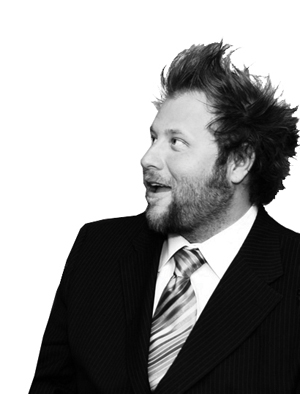Sure, his hair looks like it was styled by Visigoths. His multicoloured socks don't match. And he says he'd be more comfortable in a hoodie than the pinstripe suit he's wearing. But please, don't call Michael Sikorsky, '96 BSc(CompEng), a "crazy genius."
"I hate it!" he says when we meet in a Good Earth café at Calgary's Glenmore Landing. "I think my strength is in dot-connecting. I don't think I'm super smart. I do think I connect dots faster than other people."
The mismatched socks are for good luck, like a playoff beard. They remind him of the day he realized his career path wouldn't be dictated by a corporate manual. "It just hit me in a lightning-bolt moment," he says. "This is all fake. I can make whatever I want to make. I can do whatever I want to do. There are no rules. There is no system."
Sikorsky began formulating this approach while at the University of Alberta. "I love how engineering tries to break you, and you really find out what your mettle is." He also learned to challenge his parents' conventional wisdom and to embrace being a "contrarian." He graduated just as the Internet was taking off, writing computer code on contract.
Just out of school, he dove into the entrepreneurial deep end, leaving himself no plan B or escape route. The only way out was to succeed, he says, adding that much of his drive came out of a very personal place.
"My family was really poor," he says. "My parents had divorced. My mom had no retirement. So I had an 'entrepreneurial seizure' to fix money problems."
Seventeen years later, he's the CEO of Robots and Pencils, a Calgary-based company that creates applications for iPhones and iPads. Their game, Spy vs. Spy, went to No. 1 in Apple's App Store, and now the company is developing a five-credit high school course on the iPad for Alberta Distance Learning Centre. But the path that brought him here was not a direct one. Sikorsky admits to making thousands of mistakes along the way, including what he calls an unbelievable ability to take on risk. After selling off one company, he'd go "all in" financially on the next one, and again on the one after that.
He credits his wife and business partner with convincing him to change. "Camille helped me understand that if I kept doing what I was doing I was going to be on a treadmill forever: money out, money in, money out, money in," he says.
Now that he's midway through his five-year term as the U of A's first Entrepreneur in Residence, he counsels students to take a more gradual approach. "Contract more, plunge less," he tells them.
He runs Startup School for students, a no-cost, no-credit course that takes place over a weekend. It's about demystifying business and encouraging students to jump in while they're unencumbered and accustomed to working hard for little reward.
He also created Beaver's Den, an annual opportunity for U of A students who want to pitch their business ideas to investors. Modeled on CBC's television program Dragons' Den, the students ask investors to put their money into products or business ideas ranging from computer hardware to jewelry stands. The winner of this year's Beaver's Den was a design for a computer keyboard that combines the functionality of a mouse with configurations for keys and commands. Sikorsky will be financially backing the development of the product.
Not every student is an all star waiting to be discovered, but you never know unless you give them an opportunity to shine, he says. "Those kids just need a shot."
Sikorsky says the secret to making a successful pitch is a great story. All the MBA graphics in the world won't help you if your story isn't compelling, he says. "If you can tell the story right, everyone can believe in it and everyone can push it forward."
Conversely, he also warns beginners about getting tangled up too early with investors because managing their anxiety can eat up a lot of time and effort. For him, a talented team is just as important as your story. "I don't really believe in inspiration. I believe in serendipity, because if the talent gets a chance to play with stuff all the time, magic happens."
Sikorsky is 40 now, and, after developing and selling several companies, he has a hundred-year plan for Robots and Pencils. He wants to have the same business card when he's 85 and leave something to his four children.
But no matter how well things are going, Sikorsky says, "I'll always worry that my greatest success just happened. That I'm never going to do better than what I just did. I'm like that retail storefront person that's scrubbing the window at night because I see a fingerprint on it. And that doesn't go away.
"When it does, that's when you retire, I guess."

We at New Trail welcome your comments. Robust debate and criticism are encouraged, provided it is respectful. We reserve the right to reject comments, images or links that attack ethnicity, nationality, religion, gender or sexual orientation; that include offensive language, threats, spam; are fraudulent or defamatory; infringe on copyright or trademarks; and that just generally aren’t very nice. Discussion is monitored and violation of these guidelines will result in comments being disabled.